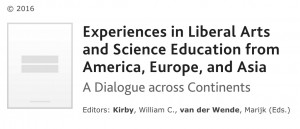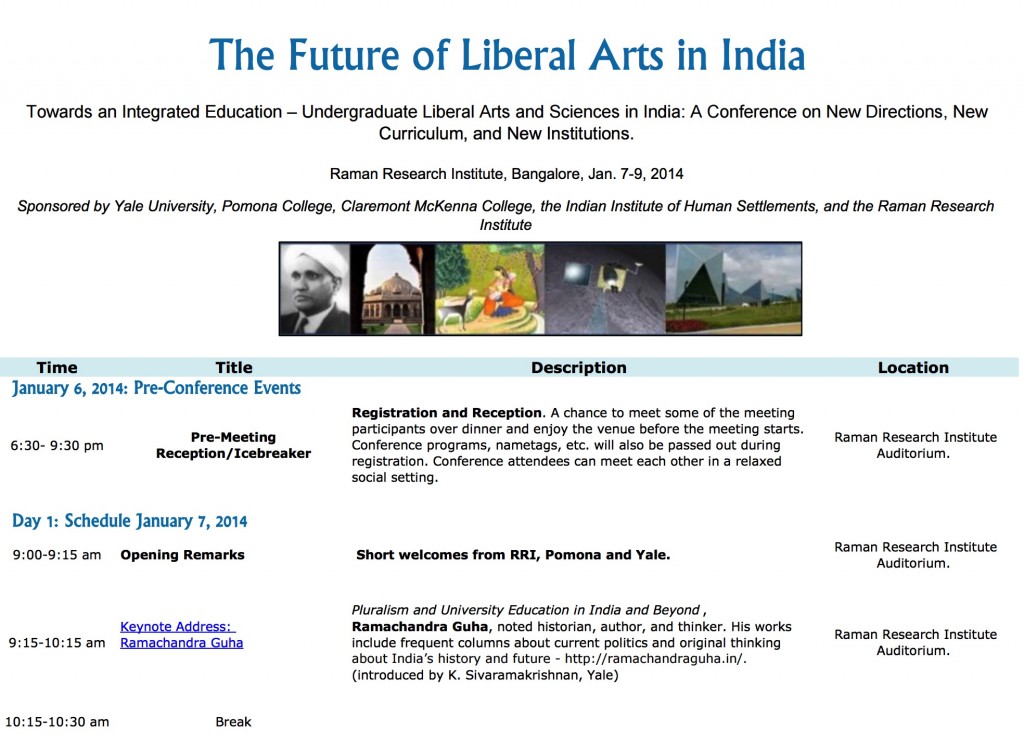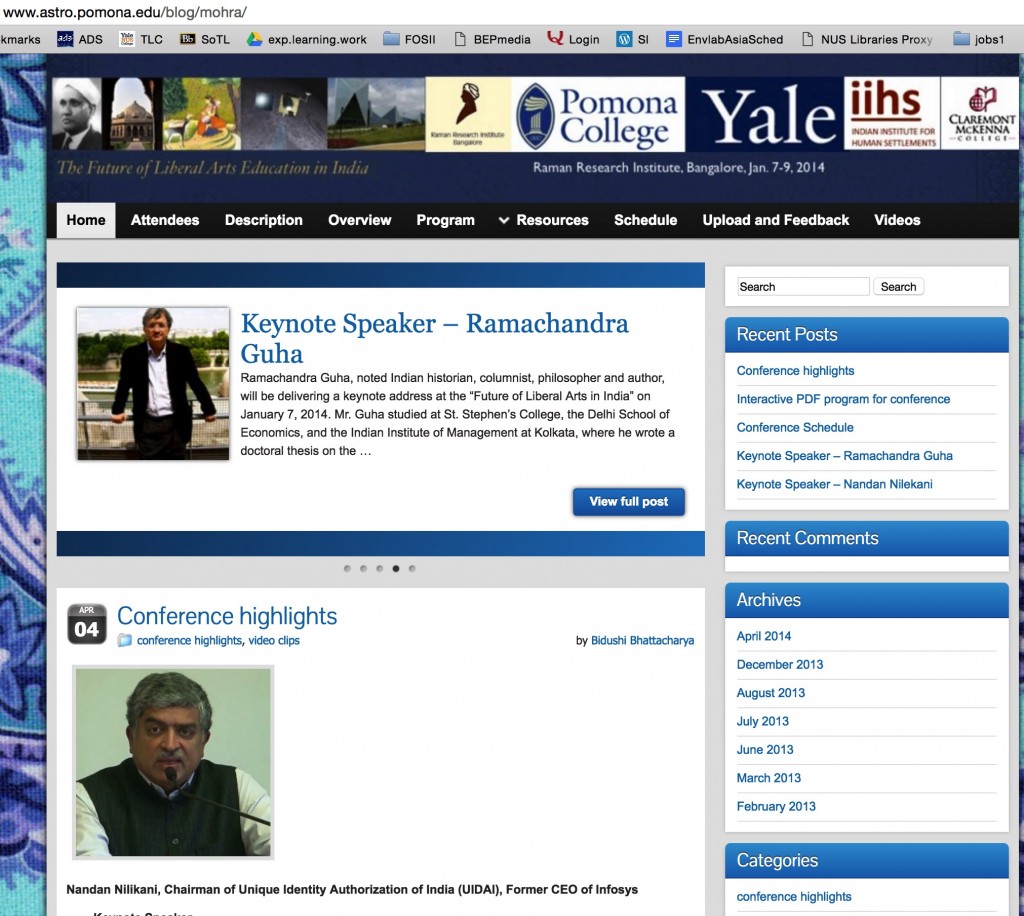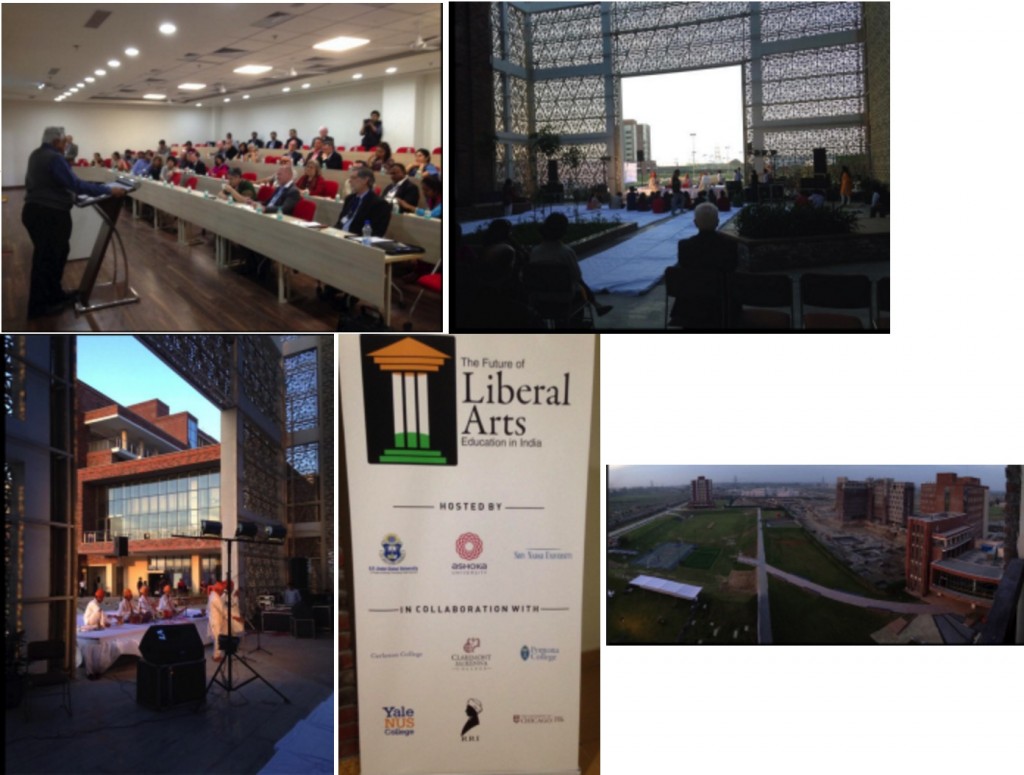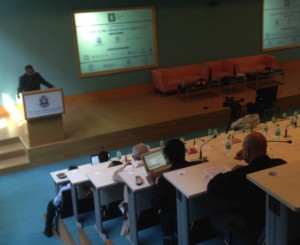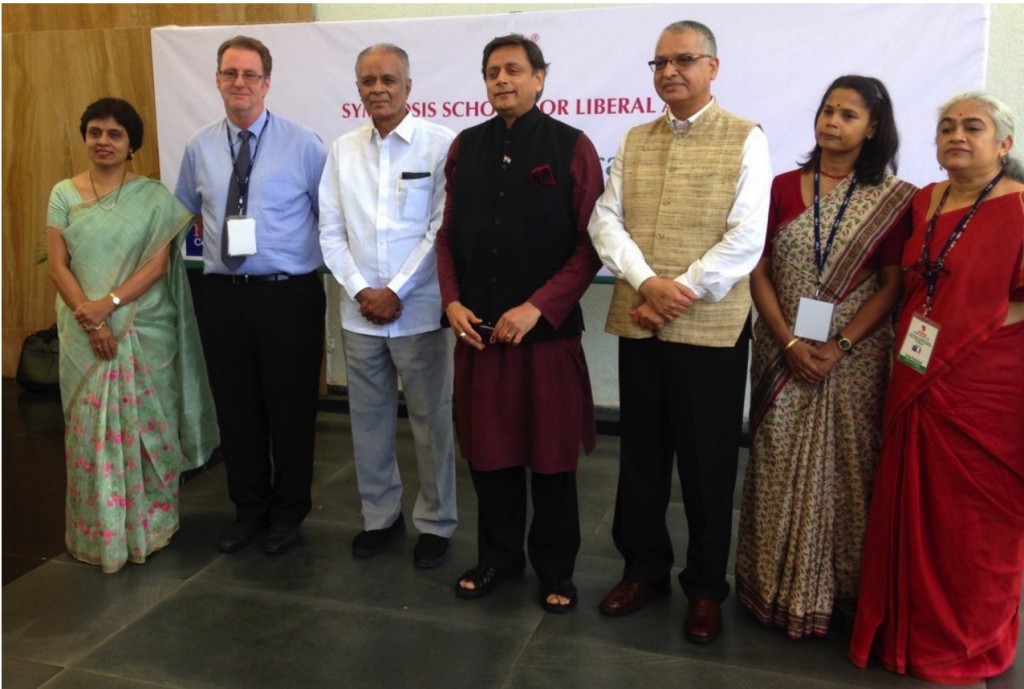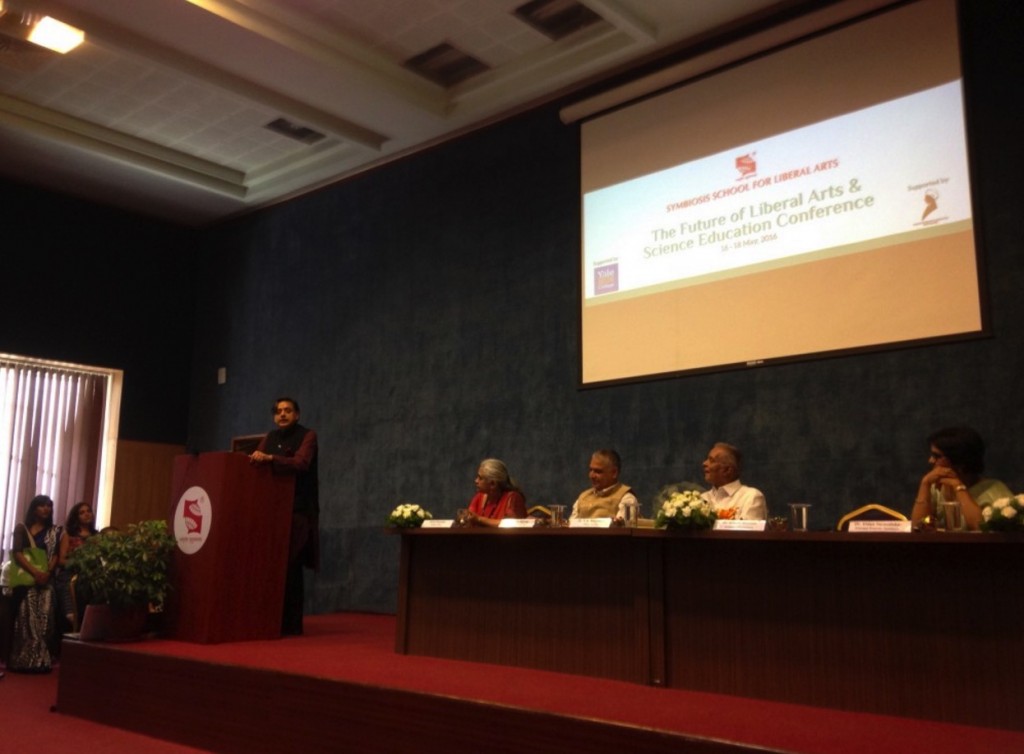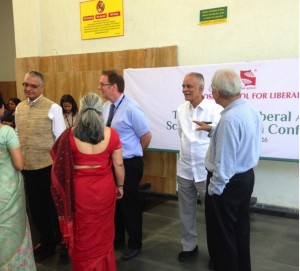The Future of Liberal Arts and Sciences in India – A Historic Moment for Indian Higher Education
During my ACE fellowship at Yale, I had the privilege of convening the leaders of a network of emerging liberal arts and sciences universities in India. This work began through the Yale India Initiative, which began during Richard Levin’s Presidency. The Yale Internationalization office, with the help from George Joseph, enabled me to visit New Delhi in April of 2013, where I met with the leaders of the new Ashoka University (including Ashish Dhawan, one of the founders and a Yale alumnus and Pramath Sinha, founding Vice Chancellor of Ashoka). The visit also included a trip to talk with the founding Vice Chancellor of the new O.P. Jindal Global University, Raj Kumar, and a visit to talk with the founding Vice Chancellor of the new Shiv Nadar University.
These leaders were dynamic and idealistic and made a real difference by providing a genuinely new model of higher education in India. The creation of these new institutions in many ways is a historic moment in Indian higher education, as they offer to create new forms of liberal arts that blend the best of liberal arts as developed in East and West with curriculum and pedagogy that will be relevant to students hoping to help tackle the complex interdisciplinary problems facing India and the world. I thought that it would be opportune to bring the leaders together with similar leaders from the United States. I organized such a meeting in January 2014 with a committee that included Lakshmi Saripalli from Raman Research Institute (Bangalore), Pramath Sinha from Ashoka, and Aro Revi from IIHS in Bangalore. Our first meeting convened in January 2014, and this was followed by a second meeting at Ashoka and Jindal in March 2015. A third meeting was convened in May 2016 at Symbiosis University in Pune. Below are details of all three of these meetings and a summary of the topics covered.
I have written a chapter for a book that discusses Indian Liberal Arts. This book is entitled Experiences in Liberal Arts and Science Education from America, Europe, and Asia and was based on a conference in Shanghai, China, in May 2015. The book was published by Palgrave, and a link to the book and my chapter is below.
My chapter is entitled “New Liberal Arts and Sciences Institutions in India and Singapore: The Role of STEM Education” and is available at Springer Link.
https://link.springer.com/chapter/10.1057/978-1-349-94892-5_5
Below is more information about our Future of Liberal Arts and Science in India conferences!
The Future of Liberal Arts and Sciences in India Conference, Raman Research Institute, and Indian Institute of Human Settlements, January 7-9, 2014.
The Raman Research Institute, the IIHS, faculty from Yale University and the Yale-NUS College, and the Claremont Colleges, co-sponsored a meeting on January 2014 on the “Future of Liberal Arts Education in India” at the campuses of the Raman Research Institute, and the Indian Institute for Human Settlements, in Bangalore, India. The meeting brought together some of the most dynamic and imaginative leaders of higher education in India, the US and beyond. Below are some excerpts from our meeting website.
The attendees included the founding Vice Chancellors, Directors and Presidents of emerging new institutions in India, including the Ashoka University, Azim Premji University, Indian Institute of Human Settlements, the O.P. Jindal Global University and Shiv Nadar University and the leader of the Krishnamurti Foundation. Leaders from the new Yale-NUS College, Pomona College President David Oxtoby and Claremont McKenna College President Hiram Chodosh also attended, accompanied by a team from the Claremont Colleges. The Yale University Director of the South Asian Studies Council, Dr. K. Sivaramakrishna, led a delegation from Yale representing humanities, physics, and social sciences. Chancellors from two University of California campuses, Pradeep Khosla from UC San Diego, and George Blumenthal from UC Santa Cruz, attended and provided their perspectives. At the meeting, the gathered leaders from the US and India engaged in discussions to answer specific questions about higher education and its role in helping solve India’s societal problems, and developed plans to work toward future collaborations and partnerships to develop new models of undergraduate education in the US and India.
Our meeting began a discussion of how India can develop and build its own academic traditions that create lasting and meaningful impact for Indian society. The meeting was an occasion to not only assess the relevance of and need for Liberal Arts education in India but as a meeting place for pioneers, thinkers, and trailblazers to engage in an exchange of experiences and ideas.
Raman Research Institute hosted the meeting at its campus in Bangalore India. The Organizing Committee consisted of Prof. Bryan Penprase, the Frank P. Brackett Professor of Astronomy, Pomona College, Dr. Lakshmi Saripalli, Astrophysicist and Raman Fellow, Raman Research Institute, Bangalore, India, Prof. K. Sivaramakrishnan, Chair, South Asian Studies Council; Director, Yale India Initiative, Yale University, Dr. Aromar Revi, Director of the Indian Institute of Human Settlements, Bangalore, and Prof. Pramath Sinha, Senior Director of Albright Stonebridge Group, founding Vice Chancellor of the Ashoka University, and founder of the Indian School of Business (ISB).
A meeting prospectus, with the conference schedule is available at the link below:
liberal.arts_.in_.india_.conference.prospectus.1.6.14 (PDF)
The Future of Liberal Arts and Sciences in India 2015, Ashoka University, O.P. Jindal Global University, and the University of Chicago Center, March 2015.
After the success of our first meeting, we convened a second meeting in New Delhi, which met on March 19-21, 2015.
The second meeting was intended to take these discussions to another level. While preserving the open-ended contemplation of the future of liberal arts in India,we brought together academic leaders and professors, social entrepreneurs and leaders of industry to create new partnerships that can harness the creativity and energy of India to develop students who are capable of inventing India’s new future. The meeting was based at two dynamic new institutions, Ashoka University and O.P. Jindal Global University, as well as at the new University of Chicago Center, with co-sponsorship from Shiv Nadar University. At the meeting we discussed new forms of teaching in India, Singapore and North America, new liberal arts and sciences curriculum development in India, and new types of engaged, socially relevant, interdisciplinary scholarship in India and beyond. These new models of teaching and research build on India’s illustrious academic and spiritual traditions and offer to provide a peaceful future for the nation and the world.
The March 2015 meeting was based at the Crowne Plaza Hotel in Rohini. Bus transport was provided by our local organizers from Ashoka for two day-long sessions at both the Ashoka University and the O.P. Jindal Global University, about an hour north of the conference hotel. Presentations included talks from Indian academics and leaders from Ashoka, Jindal, Shiv Nadar, IIHS, U. Ahmedabad, IIT Ghandhinagar, Presidency College (Kolkata), Shiv Nadar University (Bangalore), and several other excellent Indian universities. Attendees from North America included teams of faculty from Pomona College, Claremont Mckenna College, Caltech and Carleton College, and all three of these excellent colleges co-sponsored the meeting along with the host institutions from India. Steve Poskanzer, President of Carleton College, came to the conference and gave a great speech on “Creating a Culture of Teaching Excellence.”
The Third Future of Liberal Arts and Sciences in India Meeting – Symbiosis University – Pune, India, May 2016. Our third Future of Liberal Arts and Sciences in India conference provides a retrospective of the new institutions after three years of operation. It will give a great chance for more engaged collaborations in faculty development, curriculum design, and creating new programs and internships. This meeting was from May 16-18, 2016, hosted by Symbiosis University of Pune India. Some highlights included a keynote address by noted author, former UN secretary, and MP, Shashi Tharoor, and Dr. Furqan Qamar, Secretary General of the Association of Indian Universities.
Below is an outline of some of the themes for the 2016 Pune meeting (sometimes known as FLA III):
FUTURE OF LIBERAL ARTS AND SCIENCE EDUCATION CONFERENCE 2016
1) Why Liberal Arts?
The presentations in this theme will provide a cogent and persuasive argument for liberal arts education and specifically in the Indian context. This set of talks will include position pieces that motivate and inspire the public, donors, and policymakers for the relevance of liberal arts as a vital program in higher education. This will also look particularly at its connections to Indian culture, society and the future of India.
2) Framing Policy for Liberal Arts
Participants will discuss whether we need a specific policy to re-orient liberal arts curriculum and philosophy to the Indian scene. Keeping in mind environmental degradation, poverty, conflicts and social disparities that are part of the Indian situation, how do embed a sensitivity component to our policy? At the same time how do we ensure classrooms that promote inclusivity for students with learning and physical disabilities, and socially and linguistically marginalized groups? Furthermore, considering the growth of Liberal Arts institutions in South Asia, how can we create institutional partnerships to promote cooperation within the subcontinent?
Promoting Inclusivity within Liberal Arts Institutions
Potential for negotiating South-Asian issues through regional Institutional cooperation
Embedding sensitivity within the Liberal Arts program
3) Program Building in Liberal Arts and Science Education
The participants in this theme will provide a guide that explains how their institution offers innovative programs in foreign study, student exchanges, faculty exchanges, experiential learning, athletics, and other consortial arrangements. Many of the participants will also be tasked with discussing the possibility of implementing types of arrangements within and between the institutions represented at the conference. The hope is that several specific new programs for exchanges and collaboration will arise directly from the work of this group.
Developing content for courses based on perceived requirements
Introducing new minor programs that are uncommon at the UG level
The challenges of integrating interdisciplinary studies
4) Liberal Arts and Science Education in Practice
The presenters in this theme will provide case studies of liberal arts courses within India or outside. These case studies will include not only the usual materials (syllabus, outline of readings, etc) but will include the learning objectives for the courses, sample assignments, and a few examples of student work. Each participant will provide a portfolio of their course to help give a sourcebook for others developing courses of this type within the newly emerging liberal arts institutions, to share make the course visible and to share the reflections and changes that have been made to the course in multiple offerings. This theme will also try address the ways in which faculty can partner to co-teach comparative courses or develop modules that will work across institutional partnerships.
New pedagogical methods in liberal arts and science education
Developing methods and curriculum for joint or co-teaching courses across universities
Innovation in evaluation techniques
Learning outside the classroom through field engagements and community outreach programs
5) Reflecting on the Liberal Arts Experience
Presenters under this theme will respond to a curiosity of the general public and industry regarding the fairly new experience of Liberal Arts. It will be a space for student responses, and industry professionals that hire or are looking to hire Liberal Arts graduates. The speakers will address unique skills that Liberal Arts education brings and also look at potential gaps to make it more conducive for career opportunities.

